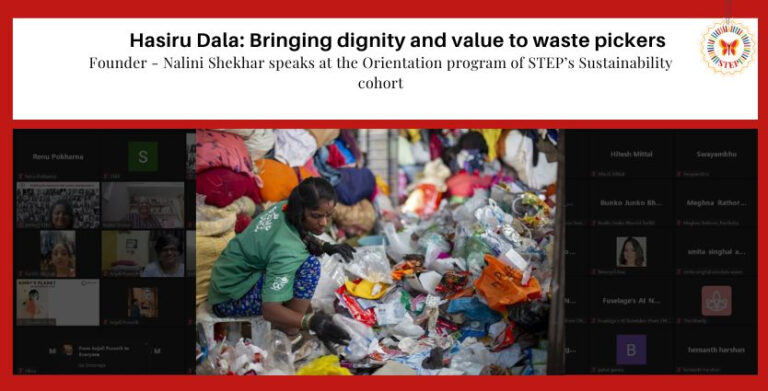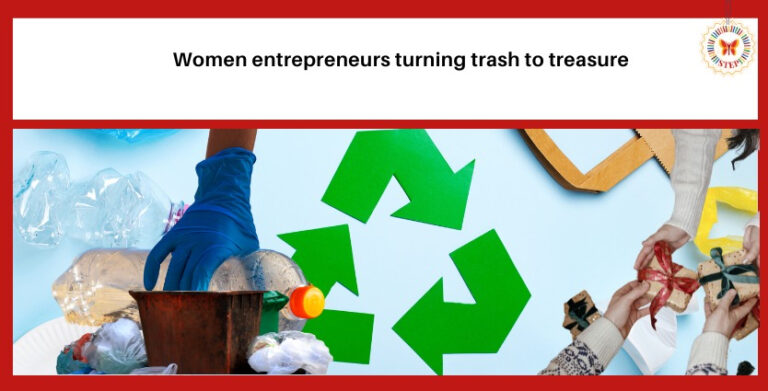Empowering Women Entrepreneurs in Sustainability: The Perfect Time to Scale Dreams
Written by: Ms. Swati Shah Gupta
On October 1st, 2024, UnPollute organised a panel discussion to explore a vital topic: Empowering Women Entrepreneurs in Sustainability: Financing Solutions from Government & Private Sector. This feature presents key learnings from the panel discussion.
A quiet revolution is taking place in the vibrant ecosystem of India’s startup landscape. Women entrepreneurs are leading the charge in sustainability, combining their innovative ideas with deep commitment to addressing some of the most pressing issues of our time: climate change, resource efficiency, and social equity. At the intersection of government support, private capital, and entrepreneurial grit lies a story of transformation that must be told and amplified.
This transformation is timely. India’s ecosystem for startups, particularly in the sustainability domain, is growing at an unprecedented pace. As of February 2024, India has over 6,600 cleantech startups operating across 450 districts in 34 states (Source: Startup India). Notably, nearly 40% of these climate tech startups are led by women as founders, co-founders, or chief executives (Source: The Economic Times). These women are rewriting the narrative of entrepreneurship by focusing on solutions that promise profits and promote positive environmental and social outcomes.
Yet, the journey is far from straightforward. While the innovation potential is immense, navigating the complex corridors of funding, market access, and scaling can be daunting. This is where the convergence of government initiatives, private sector investment, and community support plays a transformative role.

The Role of the Government: Policy, Capital, and Market Access
The Indian government has stepped up to create an enabling environment for startups, particularly those addressing sustainability challenges. From framing policies to seeding innovation, the state is a pivotal player in this ecosystem. Programs like Startup India, spearheaded by the Department for Promotion of Industry and Internal Trade (DPIIT), have laid the groundwork for a vibrant startup culture. Complementing this is the Fund of Funds for Startups (FFS), managed by SIDBI, which allocates ₹10,000 crore to venture capital firms, of which ₹1,000 crore is earmarked for women entrepreneurs.
What’s particularly noteworthy is the government’s ability to blend policy and capital with market facilitation. Platforms like the Government e-Marketplace (GEM) have democratized access to public procurement, allowing startups to sell directly to government entities. This is a game-changer for entrepreneurs who often find themselves locked out of traditional procurement processes. Whether it’s supplying eco-friendly packaging solutions to public sector organizations or providing innovative water management systems to urban bodies, GEM has emerged as a powerful enabler. Moreover, initiatives like the Startup India Seed Fund provide critical early-stage support, offering up to ₹20 lakh to entrepreneurs with promising ideas. This seed capital is not just financial; it comes bundled with technical assistance and access to government connections, ensuring that ideas can be tested, refined, and scaled.
The Private Sector’s Crucial Role: Risk Capital and Beyond
While government initiatives lay the foundation, private sector investors inject vitality into the startup ecosystem. Venture capital firms, angel investors, and blended finance initiatives bring the risk capital required to fuel high-growth, high-risk ventures. This capital is particularly crucial in sustainability, where the return on investment often takes longer to materialize compared to conventional sectors.
However, as Ms. Archana Jahagirdar, Managing Partner of Rukam Capital, pointed out during the panel discussion, equity financing is not a handout. Investors, whether they are deploying public funds like those from SIDBI or private pools of capital, expect robust business models and clear paths to profitability. Debt, especially for early-stage startups without product-market fit, is a no-go, as it can stifle innovation and lead to financial distress.
The private sector also plays a significant role in fostering innovation through challenges and incubators. For instance, partnerships between DPIIT and private organizations like Avana Capital have created opportunities for startups to access not just funding but also mentorship and networks. These collaborations are instrumental in helping entrepreneurs transition from ideation to execution, providing them with the tools they need to scale sustainably.
Challenges on the Road to Success
Despite the encouraging numbers and supportive ecosystem, women entrepreneurs face unique challenges. Many startups struggle with access to financing due to a lack of collateral or a limited track record. Public procurement systems, especially at the state and municipal levels, often remain opaque and bureaucratic, deterring smaller enterprises from participating. Additionally, the journey from ideation to scaling oben requires handholding in areas like financial management, market strategy, and operational efficiency.
Moreover, while sustainability is a hotbed for innovation, it is also a space where the risks are higher, and the returns take longer. This makes blended finance—a mix of public grants and private equity—a critical tool for de-risking investments and acquiring private capital. Institutions like the WASH Innovation Hub, led by Professor Srinivas Chari Vedala, is pioneering such models. By incubating startups in water, sanitation, and waste management, and connecting them with both public and private funders, these hubs are creating pathways for impactful innovations to reach the market.
Women Entrepreneurs: Dreaming Big and Delivering Impact
The increasing representation of women in the sustainability space is not just a statistic; it’s a testament to the changing aspirations and ambitions of Indian entrepreneurs. These women are not only creating wealth but also driving systemic change. From promoting circular economy practices to developing climate-resilient infrastructure, their contributions are shaping a more sustainable future. Yet, as Ms. Arti Bhatnagar, Additional Secretary at the Ministry of Commerce and Industry, rightly highlighted, women entrepreneurs often shine at the ideation stage but face hurdles in scaling up. This is where mentorship and community support become crucial. Programs tailored to equip women with financial and operational acumen can make a world of difference, helping them transition from being innovators to business leaders.
Advice for the Next Generation of Entrepreneurs
As the panelists collectively emphasized, the journey of entrepreneurship, especially in sustainability, is not for the faint-hearted. It requires passion, preparation, and perseverance. Here are some key takeaways for aspiring women entrepreneurs in this space:

The Time Is Now
As India’s startup ecosystem continues to mature, the opportunities for women entrepreneurs in sustainability are immense. The government’s proactive policies, coupled with the private sector’s growing appetite for impact investments, have created the perfect storm for innovation and growth. For women working at the intersection of climate, gender, and entrepreneurship, this is the moment to dream big and act decisively.
The tide is turning, and the time is right. As women entrepreneurs rise to the occasion, they are not just building businesses—they are shaping a more inclusive and sustainable world. Their success is India’s success and their journey deserves all the support, celebration, and amplification it can get.
Notes:
On 1st October 2024, STEP presented UnPollute, an event that aims to unite government, industry, and women entrepreneurs to address major environmental issues like waste management, the circular economy, climate tech, sustainability, and ESG. This event offered a comprehensive and global viewpoint, supporting women-led startups in driving innovation and sustainable growth to foster collaboration and advance India’s long-term development goals.
Panelists
- Ms. Arti Bhatnagar, Additional Secretary and Financial Advisor, Ministry of Commerce and Industry
- Ms. Archana Jahagirdar, Founder Rukam Capital
- Mr. Srinivas Chary, CEO, WASH Innovation Hub & Professor, Administrative Staff College of India (ASCI)
- Ms. Swati Shah Gupta, Panel Moderator: Urban Infrastructure Finance and Impact Investment Expert



